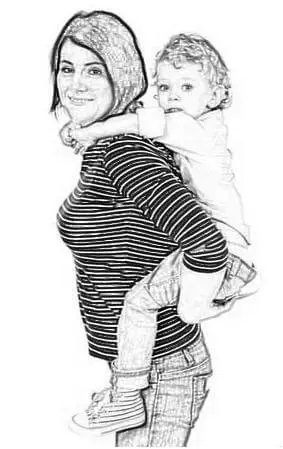To ride piggyback is to be carried on the back and shoulders of another person. Often, the person being carried is a child, either by an adult or another child. More recently the term has been applied to any person or process that is carried along by another.
Piggyback
What's the meaning of the word 'Piggyback'?
What's the origin of the word 'Piggyback'?
Whenever I include a derivation of a single word like piggyback on this site, which is about phrases and sayings after all, I always feel obliged to justify it. As we will see below, ‘piggyback’ began its life as two words, so let’s start from there.
What’s the connection to pigs and to other ‘piggy’ phrases like ‘on the pig’s back‘, ‘high on the hog‘ etc? Well, there isn’t one – because ‘piggyback’ has nothing to do with pigs. In the 20th century, we settled on the ‘piggyback’ spelling, but the term has existed in myriad forms over the years – ‘a pick-apack‘, ‘pick-a-back‘, ‘pig-aback‘ and so on.
The earliest forms of ‘piggyback’ were the medieval ‘pick back’ and ‘pick pack’. These are cited within a year of each other in the 1560s, both in essays on religious themes:
John Rastell’s A confutation of a sermon pronounced by Mr. Juell, 1564 – “What a tale is this, that the oblation of the church should be borne vpon an Angell (on pick pack perchaunce).”
James Calfhill’s An aunswere to (John Martiall’s) treatise of the crosse, 1565 – “To easy… is that way to heauen, whereto we may be caried a pickbacke on a Roode [a horse]”.
The common ‘pick’ part of these derives from ‘pitching’, either in the sense of ‘placing’, as in pitching a tent or ‘throwing’, as with a pitchfork. ‘Pack’ and ‘back’ refer to the load and the place it is carried respectively, and it is clear that ‘pick pack’ and ‘pick back’ are effectively the same expression.
Pigs aren’t known as beasts of burden, so why ‘piggyback’? This appears to be no more than a misstating of the earlier forms of the phrase. Pigs don’t get involved until the 18th century, as listed in Robert Ainsworth’s, Thesaurus linguae Latinae compendiarius, 1736:
Back, To carry on pig back
‘Piggyback’ arrives in 1843, in Baynard Rush Hall’s The new purchase: or, Early years in the far West, in which Hall recounts a tale of a group of rowdies playing at racing with pigs carried on their back. It’s clear from the citation that ‘piggy-back’ was then a term known to the book’s readers:
Meanwhile, two thus doing piggy-back in reverse order, had gradually advanced to the door.
Other ‘pig’ phrases:
Pig’s back – on the
(In a) pig’s eye
The history of “Piggyback” in printed materials
Trend of piggyback in printed material over time
Related phrases and meanings
Browse more Phrases
About the Author

Phrases & Meanings
A-Z
A B C D E F G H I J K L M N O P Q R S T UV W XYZ
Categories
American Animals Australian Bible Body Colour Conflict Death Devil Dogs Emotions Euphemism Family Fashion Food French Horses ‘Jack’ Luck Money Military Music Names Nature Nautical Numbers Politics Religion Shakespeare Stupidity Entertainment Weather Women Work
How did we do?
Have you spotted something that needs updated on this page? We review all feedback we receive to ensure that we provide the most accurate and up to date information on phrases.
